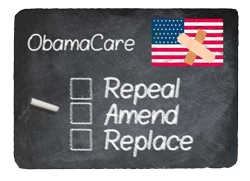 Out with the old and in with the new. That’s the sentiment the new presidential administration has been giving since President Donald Trump won the election back in November, especially when it comes to the nation’s health care program; also known as Obamacare. Obamacare, or the Affordable Health Care Act, has sparked much debate since its inception and the GOP has tried many times unsuccessfully to repeal it. However, now that republicans control the House, the Senate and the nation’s highest office, it seems like a forgone conclusion that the ACA is a goner, at least as we know it now. There is much debate on how repealing the ACA will affect our country’s taxpayers, but according to one taxpayer advocate group, Americans for Tax Reform, getting rid of Obamacare will help the middle class by repealing several tax laws currently (or soon to be) in effect under Obamacare, including the following:
Out with the old and in with the new. That’s the sentiment the new presidential administration has been giving since President Donald Trump won the election back in November, especially when it comes to the nation’s health care program; also known as Obamacare. Obamacare, or the Affordable Health Care Act, has sparked much debate since its inception and the GOP has tried many times unsuccessfully to repeal it. However, now that republicans control the House, the Senate and the nation’s highest office, it seems like a forgone conclusion that the ACA is a goner, at least as we know it now. There is much debate on how repealing the ACA will affect our country’s taxpayers, but according to one taxpayer advocate group, Americans for Tax Reform, getting rid of Obamacare will help the middle class by repealing several tax laws currently (or soon to be) in effect under Obamacare, including the following:
- Individual Mandate Non-Compliance Tax – Under the ACA, anyone who doesn’t pay for qualifying health insurance has to pay a penalty, or income surtax. In 2014, 7.5 million households had to pay this tax and most of those households made less than $250,000. By repealing the ACA that would eliminate this tax and according to the Congressional Budget Office, spending would decrease by more than $310 billion over the next decade.
- Health Insurance Tax – Under Obamacare, the price of insurance was increased via the health insurance tax. As it stands, that tax is set to cost middle class taxpayers $130 billion in the next ten years. While the tax is levied on the healthcare industry, in reality the cost of this tax is passed on to middle class families, the poor and seniors who rely on Medicaid and Medicare, and small businesses that offer health insurance to their employees. Repealing the ACA would provide a huge tax break to these groups.
- Chronic Care Tax – Some of the worst hit taxpayers by Obamacare are those with chronic health conditions and high medical expenses. Before the ACA these taxpayers could deduct these expenses after they surpassed 7.5 percent of their AGI. However, Obamacare raised that threshold to 10 percent, which made it harder to reach for these individuals and they had to pay a lot more before they hit the magic numbe. Repealing the ACA will save taxpayers $40 billion over ten years.
- Flexible Spending Account Tax – Flexible spending accounts are a great way for families to save on medical costs. However, under Obamacare they have a cap of only $2,500, which over the next 10 years is set to cost Americans an additional $32 billion extra in medical expenses. That’s a huge savings if Obamacare is repealed.
- HSA Withdrawal Tax – Health Savings Accounts (HSAs) are another great way for families to save on medical expenses and receive a nice tax deduction when they file their annual returns. However, under Obamacare, the tax on early non-medical withdrawals increases from 10 to 20 percent, which is a tax increase of $100 million in the next decade. That’s a major hit to middle class taxpayers, which means it would be another huge tax savings if Obamacare were repealed.
- Excise Tax on Comprehensive Health Insurance Plans – While it’s still several years away, Obamacare calls for a 40-percent excise tax on employer-provided insurance in the year 2020. Known as the “Cadillac Tax,” this plan would eventually be a major hit for nearly half of all employer plans, with 26 percent being hit by the tax in 2020, and 42 percent being affected by 2028. No doubt a repeal would trigger a huge tax savings.
- Ten Percent Excise Tax on Indoor Tanning – Did you know there was a tanning tax? While it raised an additional $800 million in tax revenue, thanks to Obamacare, the 10-percent tax also wiped out about 10,000 tanning salons across the country, which were mostly owned by women. Many of these salon owners make less than $250,000 annually, but Obamacare did not offer any exceptions for those in this income bracket, which went directly in contrast with the president’s promise not to raise any form of tax on Americans who make less than $250,000.
Change Is Coming
It remains to be seen how quickly the new administration moves forwards with its plans to repeal and replace Obamacare and how it will affect our country’s healthcare system. It will also be interesting to watch how much tax savings our nation’s taxpayers will actually see. In any case, it seems certain that a change is coming, ready or not.


